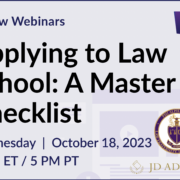Which LSAT Logic Games Should I Focus On?
Which LSAT Logic Games Should I Focus On?
In this blog, we typically write about LSAT Logic Games more than we do about any other section. On the surface, this doesn’t make sense. Since the sections on the LSAT are not weighted, Logic Games are worth the least of any section. Yet, they cause the most anxiety and fear in students. Often, students try to hedge their bets by studying what they think will appear on the test. A better approach is to study the games that will help you learn the other games faster. So, in this post, we go over what LSAT Logic Games you should focus on if you are struggling with the section as a whole.
Which LSAT Logic Games Should I Focus On?
Linear/Sequencing Games
Linear/sequencing LSAT Logic Games have appeared on every test going back to PrepTest 62. (If you wonder why we cut off our review there, check out this post!) A linear/sequencing game is the only sure thing on the Logic Games section of the LSAT. So, be prepared to tackle at least one of these. The great thing about mastering these games is they build a strong foundation for other game types, which we’ll get to later on in this list.
Grouping Games
Grouping games are also another near certainty on the LSAT. Mastering these types of games will put you in a good place when you sit for your exam. There are two different types of grouping games. Distribution grouping require you to take a set of variables and divide them into groups. The rules generally tell you how many can be in each group, who can and cannot be together, and sometimes even feature conditional rules.
Another type of grouping game is what I like to call pick-a-team, or in-and-out, game. These games ask you to choose variables for a task, like a study group. Inevitably, some variables aren’t included, meaning you also need to form an out group. Much like distribution grouping games, the rules will give you relationships between the variables that will affect who can and cannot be picked.
Both these types of grouping games have appeared often in LSAT Logic Games. Make sure you are proficient in both, though you are likely to only see one or the other.
What Do These Two LSAT Logic Games Do That Makes Them So Important To Master?
If you master linear/sequencing games and grouping games, you are actually most of the way towards mastering the rest of the games on this list. Why? The aforementioned games test rules that are commonly used in the games to follow. Once you are good at interpreting these rules and applying them, it makes the following games much easier. Read further to see why!
Advanced Linear/Sequencing Games
Advanced linear/sequencing games ask you to arrange multiple variable sets in the same game. A common version is listing a set of lectures by subject and professor. These games are not at all different from normal linear/sequencing games; all you really need to do is get comfortable with dealing with two variables sets. Students don’t believe us when we say you are 90% of the way to solving these gamed once you master linear/sequencing. The hardest part is probably setting up a useable diagram. Once you do that, the rest of the solution should be very familiar!
Hybrid Games
Hybrid games test elements of both linear/sequencing games and grouping games. As such, they generally don’t test the more difficult rules of either game type. A common example is a game that asks you to pick a group, in a specific sequence, based on conditions about who can be in or out. In this type of game, you need to worry about sequencing rules for those who are picked. You need grouping rules to figure out who can be in that set. Hybrid games test your understanding of linear/sequencing games and grouping games. Mastering those game types first make these much more manageable.
Transpositional Games
Believe it or not, the rules of linear/sequencing games and grouping games help solve these types of problems. The infamous computer virus game from PrepTest 79 is a great example. You need to put the computers in order, while also remembering other conditional rules. Again, the basics of linear/sequencing and grouping games form the basis of your logical understanding of how to attack these games,
As you can see, by focusing on linear/sequencing and grouping games first, you make mastering the other games on this list much easier. So, if you want to know where to start studying LSAT Logic Games, try these two out first.
Pursuing Law School? We’ve Got You Covered!
🌟 Special Offer: Enroll in our FREE on-demand law school prep course, meticulously crafted by a top-ranked law student. Secure your spot now





